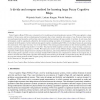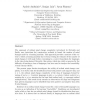901 search results - page 21 / 181 » Modelling Complex Data by Learning Which Variable to Constru... |
129
click to vote
CVPR
2006
IEEE
16 years 4 months ago
2006
IEEE
Recently, the generative modeling approach to video segmentation has been gaining popularity in the computer vision community. For example, the flexible sprites framework has been...
126
click to vote
FSS
2010
15 years 1 months ago
2010
Fuzzy Cognitive Maps (FCMs) are a convenient tool for modeling and simulating dynamic systems. FCMs were applied in a large number of diverse areas and have already gained momentu...
126
click to vote
JMLR
2010
14 years 9 months ago
2010
This paper introduces a Bayesian algorithm for constructing predictive models from data that are optimized to predict a target variable well for a particular instance. This algori...
126
click to vote
AVBPA
2005
Springer
15 years 8 months ago
2005
Springer
For Pen-input on-line signature verification algorithms, the influence of intersession variability is a considerable problem because hand-written signatures change with time, causi...
100
click to vote
EUROCOLT
1997
Springer
15 years 6 months ago
1997
Springer
The approach of ordinal mind change complexity, introduced by Freivalds and Smith, uses (notations for) constructive ordinals to bound the number of mind changes made by a learnin...


